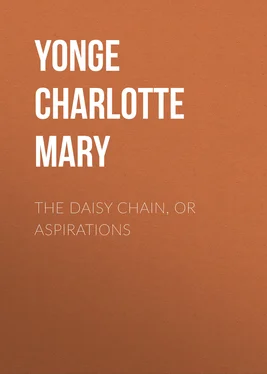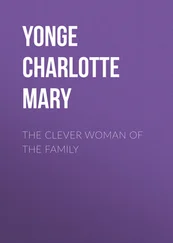Charlotte Yonge - The Daisy Chain, or Aspirations
Здесь есть возможность читать онлайн «Charlotte Yonge - The Daisy Chain, or Aspirations» — ознакомительный отрывок электронной книги совершенно бесплатно, а после прочтения отрывка купить полную версию. В некоторых случаях можно слушать аудио, скачать через торрент в формате fb2 и присутствует краткое содержание. Жанр: foreign_prose, literature_19, Европейская старинная литература, foreign_antique, на английском языке. Описание произведения, (предисловие) а так же отзывы посетителей доступны на портале библиотеки ЛибКат.
- Название:The Daisy Chain, or Aspirations
- Автор:
- Жанр:
- Год:неизвестен
- ISBN:нет данных
- Рейтинг книги:5 / 5. Голосов: 1
-
Избранное:Добавить в избранное
- Отзывы:
-
Ваша оценка:
- 100
- 1
- 2
- 3
- 4
- 5
The Daisy Chain, or Aspirations: краткое содержание, описание и аннотация
Предлагаем к чтению аннотацию, описание, краткое содержание или предисловие (зависит от того, что написал сам автор книги «The Daisy Chain, or Aspirations»). Если вы не нашли необходимую информацию о книге — напишите в комментариях, мы постараемся отыскать её.
The Daisy Chain, or Aspirations — читать онлайн ознакомительный отрывок
Ниже представлен текст книги, разбитый по страницам. Система сохранения места последней прочитанной страницы, позволяет с удобством читать онлайн бесплатно книгу «The Daisy Chain, or Aspirations», без необходимости каждый раз заново искать на чём Вы остановились. Поставьте закладку, и сможете в любой момент перейти на страницу, на которой закончили чтение.
Интервал:
Закладка:
“You must do the best you can, and try to trust that while you work in the right spirit, your failures will be compensated,” said Mr. Wilmot. “It is a hard trial.”
“I like your understanding it,” said Margaret, smiling sadly. “I don’t know whether it is silly, but I don’t like to be pitied for the wrong thing. My being so helpless is what every one laments over; but, after all, that is made up to me by the petting and kindness I get from all of them; but it is the being mistress of the house, and having to settle for every one, without knowing whether I do right or wrong, that is my trouble.”
“I am not sure, however, that it is right to call it a trouble, though it is a trial.”
“I see what you mean,” said Margaret. “I ought to be thankful. I know it is an honour, and I am quite sure I should be grieved if they did not all come to me and consult me as they do. I had better not have complained, and yet I am glad I did, for I like you to understand my difficulties.”
“And, indeed, I wish to enter into them, and do or say anything in my power to help you. But I don’t know anything that can be of so much comfort as the knowledge that He who laid the burden on you, will help you to bear it.”
“Yes,” said Margaret, pausing; and then, with a sweet look, though a heavy sigh, she said, “It is very odd how things turn out! I always had a childish fancy that I would be useful and important, but I little thought how it would be! However, as long as Richard is in the house, I always feel secure about the others, and I shall soon be downstairs myself. Don’t you think dear papa in better spirits?”
“I thought so to-day,”—and here the doctor returned, talking of Abbotstoke Grange, where he had certainly been much pleased. “It was a lucky chance,” he said, “that they brought Norman in. It was exactly what I wanted to rouse and interest him, and he took it all in so well, that I am sure they were pleased with him. I thought he looked a very lanky specimen of too much leg and arm when I called him in, but he has such good manners, and is so ready and understanding, that they could not help liking him. It was fortunate I had him instead of Richard—Ritchie is a very good fellow, certainly, but he had rather look at a steam-engine, any day, than at Raphael himself.”
Norman had his turn by-and-by. He came up after tea, reporting that papa was fast asleep in his chair, and the others would go on about Cocksmoor till midnight, if they were let alone; and made up for his previous yielding to Ethel, by giving, with much animation, and some excitement, a glowing description of the Grange, so graphic, that Margaret said she could almost fancy she had been there.
“Oh, Margaret, I wonder if you ever will! I would give something for you to see the beautiful conservatory. It is a real bower for a maiden of romance, with its rich green fragrance in the midst of winter. It is like a picture in a dream. One could imagine it a fairy land, where no care, or grief, or weariness could come, all choice beauty and sweetness waiting on the creature within. I can hardly believe that it is a real place, and that I have seen it.”
“Though you have brought these pretty tokens that your fairy is as good as she is fair!” said Margaret, smiling.
CHAPTER XVI
EVANS. Peace your tattlings. What is fair, William?
WILLIAM. PULCHER.
QUICKLY. Poulcats! there are fairer things than poulcats sure!
EVANS. I pray you have your remembrance, child, accusative
HING HANG HOG.
QUICKLY. HANG HOG is Latin for bacon, I warrant you.
In a large family it must often happen, that since every member of it cannot ride the same hobby, nor at the same time, their several steeds must sometimes run counter to each other; and so Ethel found it, one morning when Miss Winter, having a bad cold, had given her an unwonted holiday.
Mr. Wilmot had sent a large parcel of books for her to choose from for Cocksmoor, but this she could not well do without consultation. The multitude bewildered her, she was afraid of taking too many or too few, and the being brought to these practical details made her sensible that though her schemes were very grand and full for future doings, they passed very lightly over the intermediate ground. The Paulo post fulurum was a period much more developed in her imagination than the future, that the present was flowing into.
Where was her coadjutor, Richard? Writing notes for papa, and not to be disturbed. She had better have waited tranquilly, but this would not suit her impatience, and she ran up to Margaret’s room. There she found a great display of ivy leaves, which Norman, who had been turning half the shops in the town upside down in search of materials, was instructing her to imitate in leather-work—a regular mania with him, and apparently the same with Margaret.
In came Ethel. “Oh, Margaret, will you look at these ‘First Truths?’ Do you think they would be easy enough? Shall I take some of the Parables and Miracles at once, or content myself with the book about ‘Jane Sparks?’”
“There’s some very easy reading in ‘Jane Sparks’, isn’t there? I would not make the little books from the New Testament too common.”
“Take care, that leaf has five points,” said Norman.
“Shall I bring you up ‘Jane Sparks’ to see? Because then you can judge,” said Ethel.
“There, Norman, is that right?—what a beauty! I should like to look over them by-and-by, dear Ethel, very much.”
Ethel gazed and went away, more put out than was usual with her. “When Margaret has a new kind of fancy work,” she thought, “she cares for nothing else! as if my poor children did not signify more than trumpery leather leaves!” She next met Flora.
“Oh, Flora, see here, what a famous parcel of books Mr. Wilmot has sent us to choose from.”
“All those!” said Flora, turning them over as they lay heaped on the drawing-room sofa; “what a confusion!”
“See, such a parcel of reading books. I want to know what you think of setting them up with ‘Jane Sparks’, as it is week-day teaching.”
“You will be very tired of hearing those spelled over for ever; they have some nicer books at the national school.”
“What is the name of them? Do you see any of them here?”
“No, I don’t think I do, but I can’t wait to look now. I must write some letters. You had better put them together a little. If you were to sort them, you would know what is there. Now, what a mess they are in.”
Ethel could not deny it, and began to deal them out in piles, looking somewhat more fitting, but still felt neglected and aggrieved, at no one being at leisure but Harry, who was not likely to be of any use to her.
Presently she heard the study door open, and hoped; but though it was Richard who entered the room, he was followed by Tom, and each held various books that boded little good to her. Miss Winter had, much to her own satisfaction, been relieved from the charge of Tom, whose lessons Richard had taken upon himself; and thus Ethel had heard so little about them for a long time past, that even in her vexation and desire to have them over, she listened with interest, desirous to judge what sort of place Tom might be likely to take in school.
She did not perceive that this made Richard nervous and uneasy. He had a great dislike to spectators of Latin lessons; he never had forgotten an unlucky occasion, some years back, when his father was examining him in the Georgics, and he, dull by nature, and duller by confusion and timidity, had gone on rendering word for word—enim for, seges a crop, lini of mud, urit burns, campum the field, avenae a crop of pipe, urit burns it; when Norman and Ethel had first warned him of the beauty of his translation by an explosion of laughing, when his father had shut the book with a bounce, shaken his head in utter despair, and told him to give up all thoughts of doing anything—and when Margaret had cried with vexation. Since that time, he had never been happy when any one was in earshot of a lesson; but to-day he had no escape—Harry lay on the rug reading, and Ethel sat forlorn over her books on the sofa. Tom, however, was bright enough, declined his Greek nouns irreproachably, and construed his Latin so well, that Ethel could not help putting in a word or two of commendation, and auguring the third form. “Do let him off the parsing, Ritchie,” said she coaxingly—“he has said it so well, and I want you so much.”
Читать дальшеИнтервал:
Закладка:
Похожие книги на «The Daisy Chain, or Aspirations»
Представляем Вашему вниманию похожие книги на «The Daisy Chain, or Aspirations» списком для выбора. Мы отобрали схожую по названию и смыслу литературу в надежде предоставить читателям больше вариантов отыскать новые, интересные, ещё непрочитанные произведения.
Обсуждение, отзывы о книге «The Daisy Chain, or Aspirations» и просто собственные мнения читателей. Оставьте ваши комментарии, напишите, что Вы думаете о произведении, его смысле или главных героях. Укажите что конкретно понравилось, а что нет, и почему Вы так считаете.












